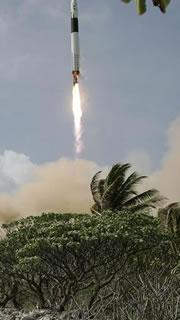 Up, up, but not away. Falcon 1 lasted less than a minute.Credit: Thom Rogers/SpaceX
Up, up, but not away. Falcon 1 lasted less than a minute.Credit: Thom Rogers/SpaceXThe rocket revolution has been postponed. The privately funded Falcon 1 launcher, which its builders hope will make access to space relatively cheap, failed half a minute into its first flight on 24 March. Early analysis points to a fuel leak as the cause of an onboard fire that brought the rocket down less than 100 metres from its launch pad on the Pacific atoll of Kwajalein.
"SpaceX is in this for the long haul and, come hell or high water, we are going to make this work, " said a web statement from Elon Musk, the Internet tycoon-turned-rocketeer, whose El Segundo, California-based company Space Exploration Technologies designed, built and launched the Falcon. Musk accentuated the positive, pointing out that key systems, including the rocket's main engine and guidance systems, appear to have worked perfectly. He hopes to try again within six months.
“Come hell or high water, we are going to make this work.”
Elon Musk
Space Exploration Technologies
Onboard the Falcon 1 was a small payload built by students at the US Air Force Academy. According to unconfirmed reports on a website maintained by Musk's brother, the satellite detached from the rocket and crashed through the roof of a machine shop, falling to the floor "mostly intact".
Cheap shot
SpaceX is counting on a combination of simple technology and lean operations to roughly halve the cost of reaching orbit. A Falcon 1 launch costs US$6.7 million for up to 570 kilogrammes of payload delivered to orbit. Musk eventually wants to build a bigger rocket that can carry 25,000 kg for the relatively low price of $78 million.
Industry analysts applaud SpaceX's accomplishments so far, given that most other rocket startups have failed before reaching the launch pad. The Falcon's kerosene-fuelled Merlin 1 has tested well on the ground and earned high reliability ratings from the Futron Corporation, an aerospace consulting company based in Bethesda, Maryland.
But it will take a record of successful launches to make a dent in the rocket business. Satellite owners, with assets worth hundreds of millions of dollars, often care more about reliability than cost.
Big investment
ADVERTISEMENT
The US military is one of Musk's key backers, and the Air Force has signed a $100 million deal for future launch services. SpaceX also has launch agreements with satellite owners in the United States, Sweden and Malaysia. Musk has so far invested about $100 million of his own money in the company.
Having made his fortune inventing the Paypal e-commerce business, Musk says the motivation behind SpaceX is the dream of establishing a space-faring civilization.
Yet Musk admits there may be a limit to his optimism. Last November he told reporters: "If we have three consecutive failures, then we probably don't know what we're doing, and we should probably exit the business."
Visit our rocketcrashesandburn.html">newsblog to read and post comments about this story.
Space Exploration Technologies
